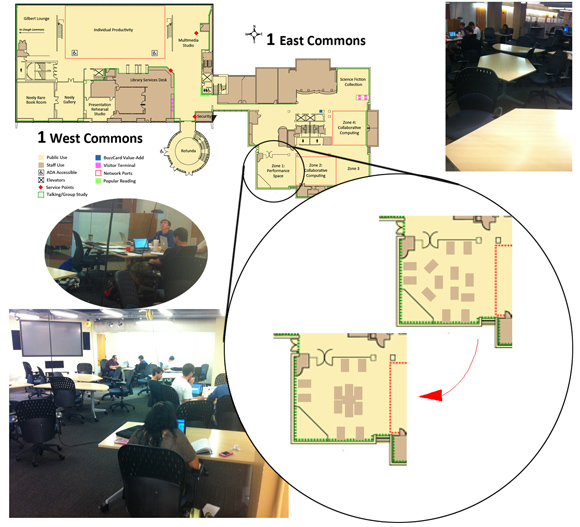Library Interventions
October 3rd, 2012 By FL-11630Ecological System: Georgia Tech Library, “performance zone” (tables on the first floor near where there used to be a coffeeshop, across the glass)
Actors/Entities:
• Students that have lots of work to do (majority here are male, average age ~21)
• Laptops, turned on, most presumably with internet connection
• Security camera pointed at the big screen+speakers presentation system
Nonentities:
• 13 tables
• Outlets all along the wall
• Outlets hanging from the ceiling in 4 places
• About 3 dozen chairs
• Vending machine drinks, snacks
• Pens, pencils, paper
• Presentation screen with large screen and speakers
• 5 overhead hanging speakers
Notable Conditions:
• Consistently chilly air
• Consistently bright fluorescent tube lighting
• A looming sense of focus and/or despair
Performance Interventions:
1. The aim of this intervention is to affect relations between entities, by getting strangers to sit at the same table. A simple Arduino device is attached to the underside of the centermost table, with switches wired to the edges where nearby tables can be pulled to hold the switches in. When any switches depress, a signal notifies the performer to return to this area and return the tables to formation.
2. The aim of this intervention is to confirm that the ecological system’s strength in asserting its identity as an entity having its own PRA. The performer’s task in this case is to see whether he or she will be rejected by the space, rather than accepted by the people in it. This is done by doing something that the people would not object to, if it were not being done in this ecological system. The performer brings a laptop with an obviously 2-player game, classic Street Fighter 2, plus 2 USB gamepads. Volume turned off (blaring audio annoyance would be too obviously a violation), the performer plays the game in single player, until A New Challenger Approaches. They play a round or a few, but when that person leaves to work, the person continues playing, with controller 2 laying out again as bait. If/when someone asks the performer to leave, the space has asserted its identity as separate from that of its individual entities.
3. The aim of this intervention is to extend the ecological system by scattering its entities into alternative contexts. As set up, the performer creates a php file that will recommend another specific study location on campus, selected at random, and direct the student to go study there. Ideally, some navigation information or map should be provided as well. Below that should be links to these articles from LifeHacker and Lawyerist, which both suggest that changing study/work location yields improved results. A QR code directing to this URL can then be printed and taped to the corner of each table in the room. If people get curious to check the QR Code, they may be persuaded to try studying at one of the other recommended locations. The performers role in this case is to hang out working at the table, periodically taking pictures of the QR code then leaving for a bit, later returning and repeating, to entice people to try it. If this proves effective, it may help those students discover a new favorite study location to alternate, and it also makes this otherwise popular section less crowded, creating a partial vacuum which may inspire more students to wander over and try it (first studying there, then being coaxed into trying some other location as well).
